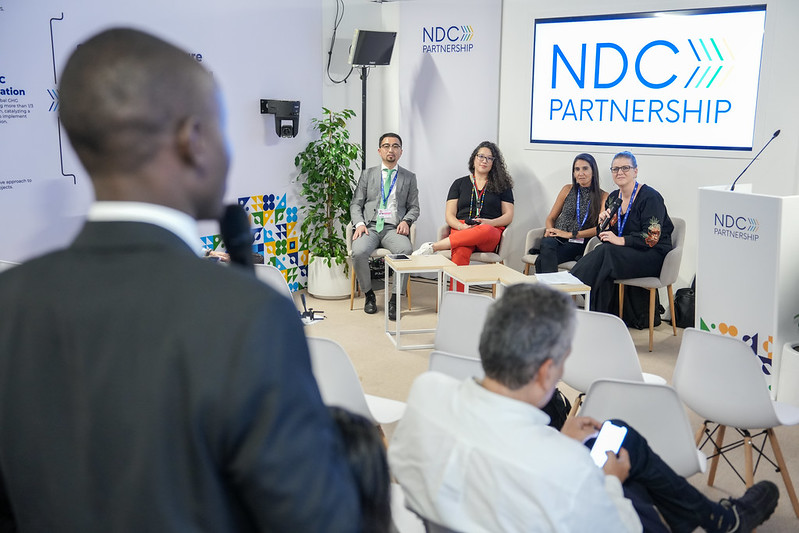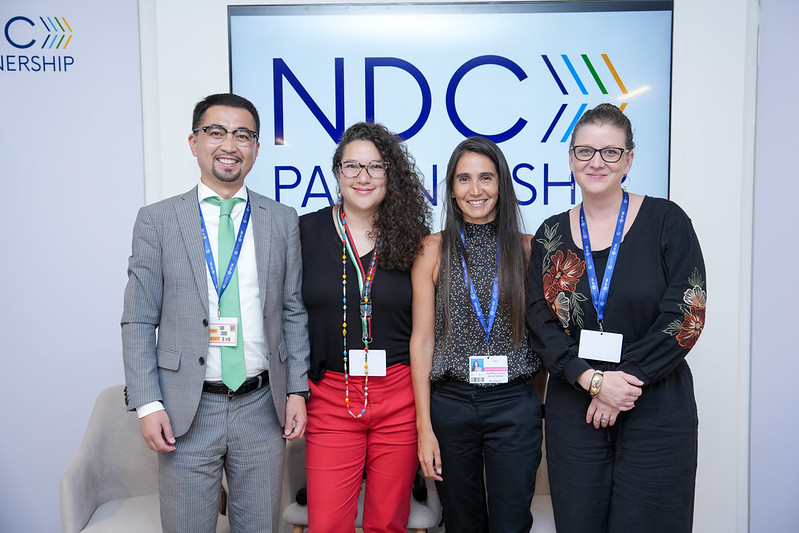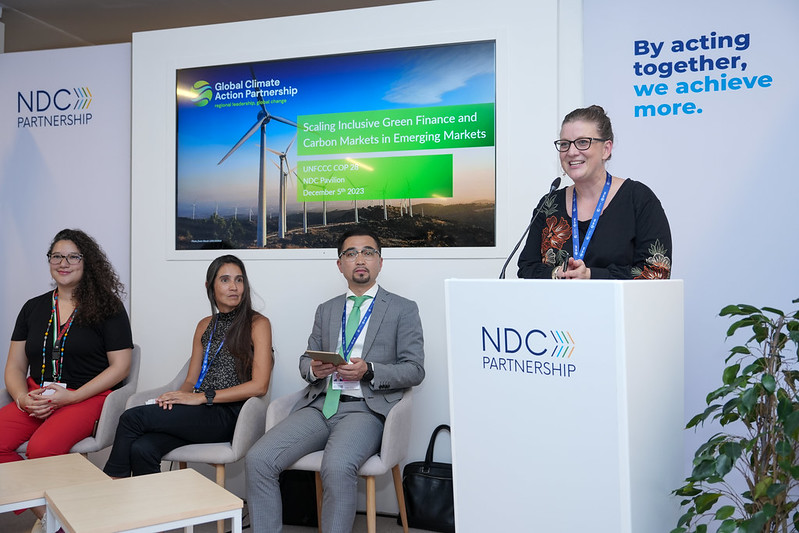
News
Scaling Inclusive Green Finance and Carbon Markets in Emerging Markets



On December 5th, 2023, at COP28 in Dubai, United Arab Emirates, the Global Climate Action Partnership (GCAP)’s network of climate leaders hosted a side event titled “Scaling Inclusive Green Finance and Carbon Markets in Emerging Markets”. This event highlighted the role of finance in accelerating low emission and net zero transitions.
Finance is a cross-cutting topic across all GCAP activities. The GCAP finance working group goal is to accelerate investment flows for climate-resilient low-emission development. The GCAP Finance Working Group, chaired by UNDP and WRI, helps developing countries to develop innovative finance instruments and investment strategies, enhance project development, and build capacities, knowledge, and skills to unlock climate finance.
Collaboration, peer to peer exchange and learning is at the core of the program, said Alexia Kelly, Co-Chair of the GCAP Steering Committee and Managing Director of Carbon Policy and Markets Initiative at the High Tide Foundation. GCAP activities are aimed at facilitating experience exchange within regions and among the international community.
Accelerating mobilization of finance for climate action is crucial to enable developing nations to achieve equitable economic growth and for all countries to implement low emission resilient measures and projects.
Alexia Kelly
In the spirit of sharing lessons and inspiring replication of good approaches, a panel of experts discussed the potential for carbon markets to scale up green finance flows.
Dastan Abdyldaev, Expert on Climate, Council on Sustainable Development and Climate Change, Parliament of Kyrgyzstan introduced Kyrgyzstan’s National Determined Contributions (NDC) that aim to reduce greenhouse gases (GHG) emissions by 16% using domestic resources and further decrease emissions by 44% with international assistance. The nation has set an objective to achieve carbon neutrality by 2050, with an estimated total cost of mitigation and adaptation amounting to $10 billion. Of this, 37% will be sourced internally, while the remaining 6.3 billion is sought through international support.
Kyrgyzstan has prioritized carbon markets as a pivotal tool to attract global financial aid, particularly from the private sector.
Dastan Abdyldaev
The Government of Kyrgyzstan has devised a grassland carbon project using voluntary carbon markets in collaboration with GIZ. It integrates both adaptation and mitigation activities and contributes to the country’s NDC objectives. Furthermore, it addresses the high vulnerability of the agricultural sector, which contributes around 20% of the country’s GDP while remaining highly susceptible to the impacts of climate change. Projections indicate that the project stands to yield approximately $1.2 million annually with an estimated total of $24 million over its lifespan.
Rocio Garcia Garcia Naranjo, Land Use and Forest Finance Specialist for Latin America and the Caribbean, UN-REDD Programme emphasized the importance of capacity building to facilitate the establishment of carbon markets that would serve each countries’ objectives. Many developing nations may face challenges, lacking necessary financial capacity or political determination to initiate their carbon markets. Acknowledging these hurdles, Rocio turned to the potential for participation in existing carbon markets.
There is a crucial need for widespread education within communities about the concept of carbon markets and how countries can participate in them without compromising their NDCs.
In this matter, strengthening capacities and disseminating knowledge should stand as a priority. Apart from that, establishing a national monitoring system for climate projects is needed to produce the credits that can be sold in different markets. Government involvement in this process, such as understanding, monitoring, and implementing grievance mechanisms and regulatory frameworks is essential to ensure the production of credits. Additionally, developing capacities to design and execute projects, while enhancing the stakeholders’ understanding of the climate markets can facilitate the engagement among global community.
Sandra Guzmán Luna, Founder, Climate Finance Group for Latin America and the Caribbean acknowledged that the needs of different countries are different and creating valid policy instruments hinges on a comprehensive needs assessment.
There is a necessity to create national strategies on carbon markets, climate finance and innovative mechanisms to understand what could be done with local resources and what can be achieved through international cooperation.
Sandra Guzmán Luna
National strategies for climate markets and finance are essential, requiring innovative approaches that leverage local resources while seeking international collaboration. Drawing from Mexico’s experience, Sandra emphasized that emission trading systems are vital to decarbonize especially carbon intensive industries, such as steel, cement, oil. While working on developing such system in her country, they first identified the sectors viable for inclusion within trading systems and aimed at fostering an understanding of how such systems work. Next, it was important to assess both the capability of emissions reduction and the workforce capacity for project design.
Sandra underscored that to create real behavioral change through the voluntary markets it is important to integrate appropriate regulations into the law. Developing countries should have comprehensive packages of measures, as a lot of economies in Latin America receive more revenues from carbon-intensive activities than from climate finance. Moreover, fiscal reforms, including mechanisms such as carbon taxing and trading systems, are imperative to change the types of incentives in place. Despite fiscal challenges, that many emerging markets face, establishing political will, implementing a national climate finance strategy, and deploying innovative mechanisms remain crucial for understanding the needs of different sectors.
The session concluded with a thought-provoking question on the progress of article 6 of the Paris Agreement, which addresses carbon market mechanisms. Additionally, the conversation revolved around the practical implementation of carbon pricing and voluntary carbon markets emphasizing their cumulative effect for reaching climate goals. Speakers also stressed that the capacity building for the financial players will facilitate the development of climate projects and foster the establishment of financial mechanisms that will advance climate targets.
Watch the session below:
This Video is hosted on Youtube. If you click to play, a connection to the provider's servers is established. Personal data may be communicated to the provider in the process. For more information, see our Privacy Policy
How to Get Involved?
Join our member network through the GCAP registration form linked below.
As you complete the GCAP registration form, indicate which Working Groups and Communities of Practice you would like to join.
